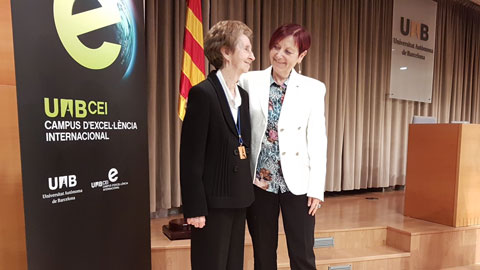Margarita Salas: "There is a need for more quality basic research"

18/04/2018
The biochemist from Asturias was presented by the Chair Professor of the Department of Genetics and Microbiology at the UAB Montserrat Llagostera, who spoke on Dr Salas important role in introducing the research and teaching of molecular biology in Spain, after spending three years as a member of Dr Severo Ochoa's laboratory group in New York. She worked there alongside her husband, renowned scientist Eladio Viñuela. Professor Llagostera also spoke on her "undeniable leadership in the study of the molecular biology of the bacteriophage ɸ29". "It was in her laboratory that DNA sequencing first took place in Spain, and she patented a key enzyme for DNA amplification, a fundamental technique in biological and biomedical research", she affirmed, without overlooking Dr Salas' "involvement in defending the role of women in our society".
In her acceptance speech, Margarita Salas described some of the main events that led up to her choosing molecular biology and in which her friendship with Severo Ochoa played a major role. The two met while on vacation in Gijón and he "was strong influence" when she decided over her future. She summed up their work relationship as "scientific experienced shared throughout 56 years of life dedicated to research", as well as the first time, while doing her doctoral thesis in Madrid, she perceived "what Severo Ochoa used to call the emotion of discovery".
Of her stay in New York with Ochoa, Dr Salas remembers "his experimental rigour, his dedication and enthusiasm". It was upon returning to Spain that she decided, alongside her husband, that there was a need to "begin a new research group" and choose the "bacteriophage ɸ29 as a system of work", at the Centre for Biological Research in Madrid, at a time in which “research receive no type of public funding".
She also spoke on the time in which she was working on a different line of research, that she focused on the study of genetic regulation of the bacteriophage ɸ29, a "complex system which can serve as a mechanism model for the control of genetic expression”.
Of the practical results of her research career, Dr Salas highlighted the in vitro DNA synthesis using the amplification based on ɸ29 DNA polymerase, and she also highlighted how "a fundamentally basic work has been able to yield important biotechnological applications and results which can be applied to other viruses of health and economic interest, such as the human adenovirus, the poliomielitis virus, the encephalomiocarditis, the Hepatitis B and C virus and a variety of plant viruses”. In this sense, Dr Salas emphasised the importance of basic research and quoted Ochoa: "there is a need for high quality basic research and freedom must be given to the researcher", while she also remarked that "a country without research is a country without development" and concluded that "there is a need to foster high quality basic research, since that is the basis of development in our country".
Dr Salas also shared her satisfaction in "teaching future scientists, supervising them and encouraging them in the difficult moments they may find themselves in during the four eyars of their PhD thesis, and especially bearing witness to their many achievements", although she also mentioned that "we must make it possible to bring back young and excellently prepared researchers" who move to other countries.
The final speech was given by UAB Rector Margarita Arboix in which she described Dr Salas as a "great woman and a great scientist who was a model to look up to while I was studying". Of her many qualities and virtues, Dr Arboix highlighted her spirit of determination, since "in 1960 she began to work on issues very few even knew about", until her return to Spain in which she opted to make research a way to "contribute to the growth of her country"; her ability to "share her research through education"; her "clear defense of equality at all levels"; as well as her "honesty".
At the event, the UAB Choir performed Universitas, written by Poire Vallvé and Rafel Simó in commemoration of the UAB's 50th anniversary, and Loch Lomond, a traditional Scottish song arranged by Jonathan Quick.
More information:
Photos of the honorary doctorate award ceremony held for Margarita Salas
Honorary doctorate award ceremony booklet